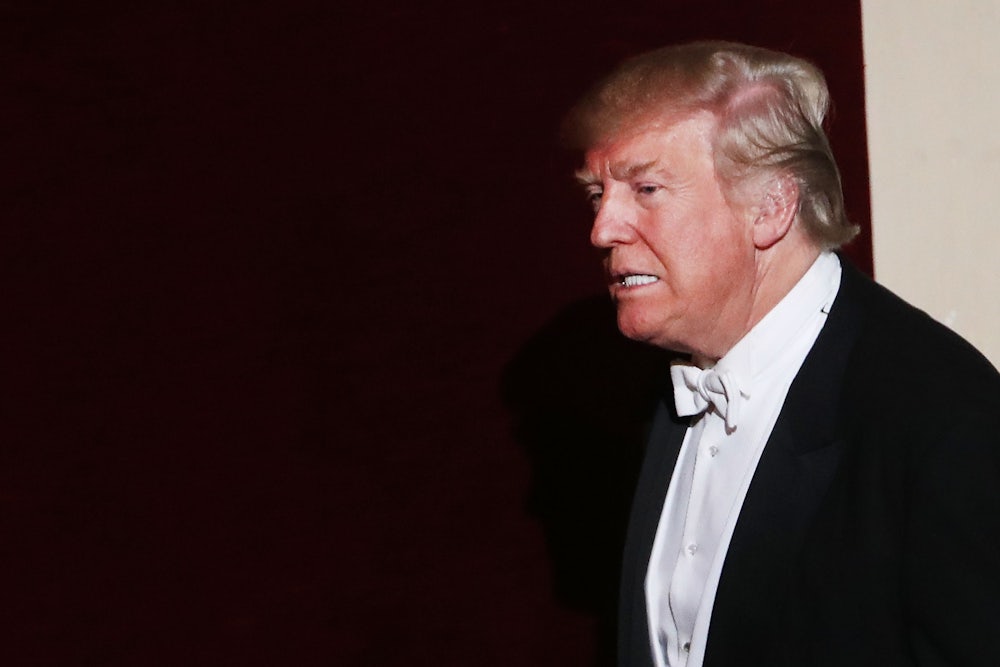The boos began when he said, “Hillary is so corrupt...” And it only got worse from there.
It’s tempting to say that Donald Trump’s speech at the Al Smith Dinner on Thursday night went over like a fart in church. This was an annual fundraiser for Catholic charities, after all, hosted in Manhattan by the Archbishop of New York, Cardinal Timothy Dolan. But passing gas in the house of God doesn’t do justice to how shameful and embarrassing the Republican nominee was at the dais at the Waldorf Astoria, turning what’s traditionally a forum for White House hopefuls to tell lighthearted jokes into a pulpit for cruel remarks about the Democratic nominee, who was seated mere feet away.
“Hillary believes it’s vital to deceive the people by having one public policy and totally different policy in private,” Trump said. “For example, here she is tonight in public, pretending not to hate Catholics.”
This, as you can imagine, didn’t go over well.
I've been to this dinner many times. Never saw anyone get booed this way during a speech.
— Maggie Haberman (@maggieNYT) October 21, 2016
Wow @realDonaldTrump is creating a really awkward situation at the Al Smith dinner. People are not laughing. #Yikes
— Katie Couric (@katiecouric) October 21, 2016
#Yikes indeed. Trump bombed big league, to use his favorite phrase, and he did so on his home turf, surrounded by the members of the New York elite he’s always yearned to be part of. It was a high-profile, high-society humiliation just over two weeks before the election, and it brings Trump full circle from the night of comedy when, some suspect, he resolved to run for president: the 2011 White House Correspondents Dinner.
At that dinner, Seth Meyers had the line of the night: “Donald Trump has been saying that he will run for president as a Republican, which is surprising since I just assumed he was running as a joke.” But President Barack Obama’s extended ridicule of Trump’s conspiracy-mongering was more devastating:
Now, I know that he’s taken some flak lately but no one is prouder to put this birth certificate matter to rest than The Donald. And that’s because he can finally get back to focusing on the issues that matter, like, did we fake the moon landing? What really happened in Roswell? And where are Biggie and Tupac?
The irony of Thursday night’s debacle was that Trump did it to himself. BuzzFeed has a senior Trump source saying he wrote the speech on his own. There’s reason to be skeptical—some of Trump’s early jokes were good and frankly didn’t sound like him—but it’s certainly plausible that he was the driving force, given some key lines in the text.
“You know, last night, I called Hillary a nasty woman,” Trump said, inexplicably bringing up one of his worst moments in Wednesday’s debate. “After listening to Hillary rattle on and on and on, I don’t think so badly of Rosie O’Donnell anymore.”
For her part, Clinton gave a much more traditional Al Smith speech, roasting Trump but staying within the bounds of good taste. “After listening to your speech,” she joked, “I will also look forward to listening to Mike Pence deny that you ever gave it.”
“Maybe you saw Donald dismantle his prompter the other day,” she said at another point. “And I get that. They’re hard to keep up with, and I’m sure it’s even harder when you’re translating from the original Russian.”
Also on the Russian theme, Clinton followed up some self-deprecating humor about her health by saying, “Donald really is as healthy as a horse—you know, the one Vladimir Putin rides around on.”
Unlike Trump, Clinton used her remarks to pay tribute to Al Smith himself, a Democrat who in 1928 became the first Catholic in American history to be a major-party presidential nominee. She noted that Smith faced immense prejudice at the time and linked his experience to contemporary struggle against bigotry.
“Those appeals—appeals to fear and division—can cause us to treat each other as the other,” Clinton said. “Rhetoric like that makes it harder for us to see each other, to respect each other, to listen to each other, and certainly a lot harder to love our neighbor as ourself.” And in an obvious allusion to Trump, she also praised Pope Francis for his “appeal that we build bridges, not walls.”
Ahead of the dinner, many noted how awkward the event would be, given the acrimony of the presidential race. Some argued that inviting Trump to the dinner at all was unseemly—that it risked normalizing the Republican nominee by putting him in the same room, as an equal, with countless politicians from both parties who have rightly identified him as representing the worst of America, even of being a threat to our democracy. But any such hand-wringing proved unnecessary. Trump, as always, made their point for them.
